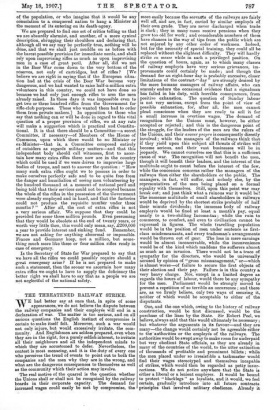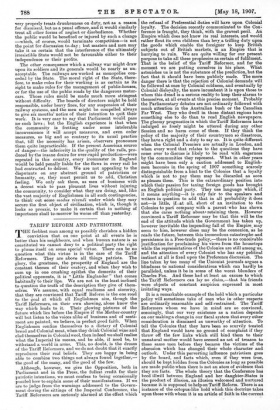THE THREATENED RAILWAY STRIKE.
WE had bettor say at once that, in spite of some appearances, we do not believe the dispute between the railway companies and their employes will end in a declaration of war. The matter is too serious, and on all serious questions the English instinct of compromise is certain to make itself felt. Moreover, such a war would not only injure, but would excessively irritate, the community. And Englishmen are seldom prepared, even when they are in the right, for a purely selfish interest, to irritate all their neighbours and all the independent minds to which they are accustomed to defer. Nevertheless, the contest is most menacing, and it is the duty of every one who perceives the trend of events to point out to both the companies and the men why they are in the wrong, and what are the dangerous consequences to themselves as well as the community which their action may involve.
The real motive of the quarrel is the question whether the Unions shall or shall not be recognised by the railway boards in their corporate capacity. The demand for increased wages could easily be met by compromise, the more easily because the servanta Of the railways are fairly well off, and are, in fact, envied by similar employes of their own grade. They are never discharged when trade is slack ; they in many cases receive pensions when they grow too old for work ; and considerable numbers of them have chances in the way of tips from the public which are not enjoyed by any other order of workmen. Indeed, but for the necessity of special training, they could all be replaced without the slightest difficulty. They will hardly strike ea masse while in such a privileged position. On the question of hours, again, as to which many classes of railway employes have very serious grievances, improvements could certainly be made ; and though the demand for an eight-hour day is probably excessive, closer limitations of the contract-" day " are strongly desired by the more humane managers of railway affairs, who can scarcely endure the occasional evidence that a signalman has failed in his duty, with horrible consequences, from positive exhaustion. The question of Sunday labour is not very serious, except from the point of view of possible exhaustion, for, after all, the men cannot plead conscience when they are ready to sell it for a small increase in overtime wages. The demand of recognition for the Unions must, however, be either accepted or rejected ; and this is the dangerous point of the struggle, for the leaders of the men are the rulers of the Unions, and their amour propee is consequently directly involved ; while the managers of the railways think that if they yield upon this subject all threats of strikes will become serious, and their vast businesses will be in jeopardy. We cannot ourselves see that this is a sufficient cause of war. The recognition will not benefit the men, though it will benefit their leaders, and the interest of the multitude ought to count before the interest of the few, while the concession concerns rather the managers of the railways than either the shareholders or the public. The managers, in fact, will suffer, and nobody else, by the representatives of the men being placed on a formal equality with themselves. Still, upon this point war may break out; and just think what a ruinous war it would be! The immense multitude of small shareholders in railways would be deprived by the shortest strike 'Probably of half their minute dividends ; the immense body of railway employes would be fined at least a month's pay, equal nearly to a two-shilling Income-tax ; while the ruin to commerce, to comfort, and even to civilisation cannot be expressed in figures. The whole travelling population would be in the position of men under sentence as firstclass misdemeanants, and every tradesman's arrangements would be thrown out of gear. The loss in mere earnings would be almost inconceivable, while the inconvenience would be of the kind which maddens the sufferers almost as much as an invasion. There would not be a trace of sympathy for the directors, who would be universally accused by opinion of "gross mismanagement," or—which is almost worse—of failure to secure the first objects of their election and their pay. Failure is in this country a very heavy charge. Nor, except in a limited degree as regards the hours of labour, would there be any sympathy for the men. Parliament would be strongly moved to prevent a repetition of so terrible an occurrence ; and there are, as we firmly believe, only two ways of securing it, neither of which would be acceptable to either of the disputants.
One, and the one which, owing to the history of railway construction, would be first discussed, would be the purchase of the lines by the State. Sir Robert Peel, we believe, always said that this would ultimately be necessary ; but whatever the arguments in its favour—and they are many—the change would certainly not be agreeable either to the authorities or the employes of the railways. The authorities would be swept away to make room for underpaid but very obedient State officials, as they are already in many of the countries of the world, to the utter extinction of thousands of profitable and prominent billets ; while the men placed under so irresistible a taskmaster would find their wages stereotyped and themselves incapable of strikes, which would then be regarded as petty insurrections. We do not notice anywhere that the State is either a liberal or a lenient employer. It would be bound to protect " blacklegs " as loyalists, and it would, we feel certain, gradually introduce into all future contracts principles that involved military obedience. Already it very properly treats drunkenness on duty, not as a reason for dismissal, but as a penal offence, and it would similarly treat all other forms of neglect or disobedience. Whether the public would be benefited or injured by such a change —which, of course, would terminate competition—is not the point for discussion to-day ; but masters and men may take it as certain that the interference of the ultimately irresistible State would not be favourable either to their independence or their profits.
The other consequence which a railway war might draw upon its soldiers and its generals would be nearly as unacceptable. The railways are worked as monopolies conceded by the State. The moral right of the State, therefore, to make rules for their working is as certain as its right to make rules for the management of public-houses, or for the use of the public roads by the dangerous motorcars. Those rules could be made much more stringent without difficulty. The boards of directors might be held responsible, under heavy fines, for any suspension of their railway systems, and the men might be compelled always to give six months' notice of their intention to quit their work. It is very easy to say that Parliament would pass no such laws ; but the English experience is that when the community is fretting under some intolerable inconvenience it will accept measures, and even order measures, so big and so contrary to its usual practice that, till the necessity has arisen, observers pronounce them quite impracticable. If the present American source of danger—the inferiority in the quality of the rails, produced by the insane desire for over-rapid production—were repeated in this country, every ironmaster in England would be held penally liable for the flaws in every rail he had contracted to deliver. We are not appealing to the disputants on any abstract ground of patriotism or humanity, or, they must permit us to add, Christian feeling. We only ask them, as men of business with a decent wish to pass pleasant lives without injuring the community, to consider what they are doing, and, like the vast majority of Englishmen in all such contingencies, to think out some modus vivendi under which they may secure the first object of civilisation, which is, though it looks so prosaic, to make it certain that in nothing of importance shall to-morrow be worse off than yesterday.







































 Previous page
Previous page